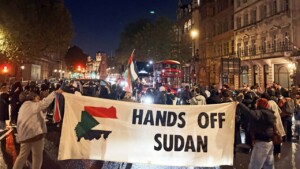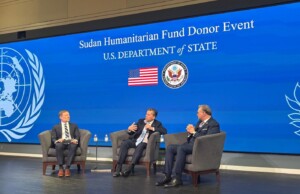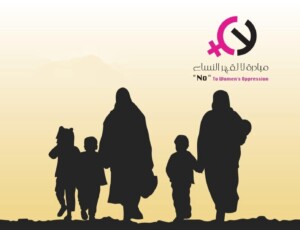Sudanese peace talks to resume on Sunday
The Sudanese peace talks will resume via teleconferencing on Sunday. The South Sudanese mediation team received two letters from the Sudanese government related to the appointment of civilian state governors and the formation of the Legislative Council.
Dhieu Mathok, Deputy Chairman of the mediation committee said in a press conference in Juba that the letters were delivered to the Sudan Revolutionary Front (RSF). The rebel leaders promised to study the contents, and respond as soon as possible.
 The peace negotiations team of the Sudanese government in Juba, December 18, 2019 (SUNA)
The peace negotiations team of the Sudanese government in Juba, December 18, 2019 (SUNA)
The Sudanese peace talks will resume via teleconferencing on Sunday. The South Sudanese mediation team received two letters from the Sudanese government related to the appointment of civilian state governors and the formation of the Legislative Council.
Dhieu Mathok, Deputy Chairman of the mediation committee said in a press conference in Juba that the letters were delivered to the Sudan Revolutionary Front (RSF). The rebel leaders promised to study the contents, and respond as soon as possible.
The SRF rebel alliance has rejected the matrix that details the responsibilities during the transitional period, including the appointment of civilian state governors. The matrix was agreed upon by the Sovereign Council, the Council of Ministers, and the Forces for Freedom and Change on Saturday.
Khartoum and the RSF agreed in November last year that new governors would be appointed in the beginning of 2020 after reaching a comprehensive peace accord. When it became clear that the peace talks would take more time, the Sudanese government proposed to temporarily appoint civilian governors “to fill the current, pressing administrative gap in the 18 Sudan states”.
Teleconferencing
The mediator further announced that negotiations will resume on Sunday morning by means of teleconferencing, in line with distancing protocols regarding the coronavirus pandemic.
Two new armed movements want to join the peace talks in Juba, he added. The Sudanese Alliance, composed of “15 revolutionary factions” under the leadership of Khamis Abdallah, and the Sudan Liberation Army led by Ahmed Ibrahim, nicknamed Kazuki.
In Khartoum, the National Peace Council confirmed that the negotiations will continue via a closed video circuit on Sundays, Tuesdays, and Thursdays, at a rate of four hours a day.
Chairman Dr Suleiman El Debeilo said in a press conference after the Peace Commission’s meeting on Thursday that they discussed the outstanding issues concerning the Darfur track, including governance, the Darfur Reconstruction Fund, and the status of the national capital.
Prime Minister Abdallah Hamdok expressed his keenness to resume direct negotiations immediately after the end of the Covid-19 pandemic.
In a telephone call on Thursday, Hamdok discussed the remaining peace issues with SRF chairman El Hadi Idris, and “how to overcome all obstacles to achieving a just, comprehensive, and lasting peace that puts an end to the wars, addresses the roots of crises, and restores security and stability in Sudan”.
Idris told reporters in Juba that the two parties agreed to continue to consult each other on all relevant issues until the new deadline for reaching a final accord set on May 9.
Waiting
The Sudan People’s Liberation Movement-North faction led by Abdelaziz El Hilu (SPLM-N El Hilu) which is not a member of the SRF alliance, reported earlier this week that its negotiating team is still waiting for the response of the Sudanese government concerning a number of items they presented in the end of February.
The faction and the Sudanese government have yet to reach an agreement on secularism and the right to self-determination for the Nuba Mountains in South Kordofan.
The negotiating team is still present in Juba, despite the apparent stalemate. The SPLM-N El Hilu also mentioned “dangerous” security tensions and military manoeuvres in South Kordofan and Blue Nile state.
The mainstream Sudan Liberation Movement, founded by Abdelwahid El Nur, refrains from joining the peace talks, despite several calls to do so.
Radio Dabanga’s editorial independence means that we can continue to provide factual updates about political developments to Sudanese and international actors, educate people about how to avoid outbreaks of infectious diseases, and provide a window to the world for those in all corners of Sudan. Support Radio Dabanga for as little as €2.50, the equivalent of a cup of coffee.












 and then
and then